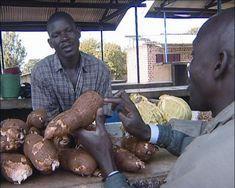
The National Farmers’ Union (NFU) and FARM-Africa have chosen a fledging cassava project to receive cash from the Africa 100 Appeal.
With funds reaching almost £200,000 one final push is being sought from the agriculture industry before a cheque is handed over to the charity in October.
Launched in the wake of droughts and the resulting poor availability of food in Kenya, the Cassava Project, operated by established charity FARM-Africa, aims to increase productivity on subsistence farms across the country and put an end to food insecurity for thousands of families.
The year-long fundraising appeal, launched as part of the NFU’s centenary celebrations, has seen charity bikes rides, golf days, generous donations from industry supporters, and the livestock sector in particular, raising a large amount of money.
Appeal co-ordinator and head of NFU communications Sarah Whitelock, said: “We started the appeal in July 2008 when many farmers were enduring the expense of a long, wet summer, which has been closely followed by a global, economic down-turn and the resulting recession. However, the farming industry has pulled out all the stops to support Africa 100 and we are extremely grateful.”
Cassava has a short shelf-life so the project will also fund two new factories to turn the vegetable into dried chips and flour.
Whitelock said: “Cassava is an important staple vegetable in both Uganda and Kenya as it has the potential to generate food security within a very short time. It grows well in marginal areas which means it can be cultivated where droughts are frequent and famine is a recurring menace.
“There were problems in the late 1980s and early 90s with disease which spread and devastated cassava crops in large parts of East Africa. Now, thanks to the vital work of FARM-Africa, a new disease-resistant variety has been introduced. This, and the addition of new, basic farming methods, has seen yields increase there from three to 15 tonnes per hectare. This has seen a reversal in the fortunes of farmers struggling to produce enough food to feed their families. Not only are they now self-sufficient but they also have enough produce left over to sell at the local market.”



